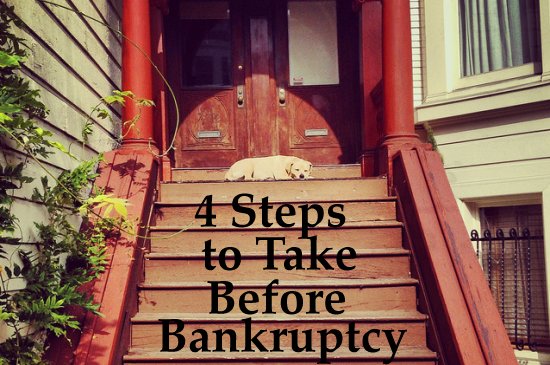
Image source: Jordan Robinson via Flickr Creative Commons
Choosing to file bankruptcy shouldn't be an off-the-cuff decision. It's serious and something to be considered when you have no other available solutions to deal with overwhelming debt that you simply can't afford to pay. Once you start considering bankruptcy, there are some steps to take in the weeks and months before you file to get the best results. Today we'll consider four important steps that every potential bankruptcy filer should take to protect their future financial interests.#1 Change Your Bank Accounts
Even though you have an automatic stay against collections once you file, some creditors are legally allowed to take set-offs against funds of yours they are holding. This is most common with banks and credit unions. For instance, if you have a credit card issued by your bank or credit union and are behind on payments, they can take money from your checking or savings account to offset this debt even after you file a Chapter 7.
To prevent this and get the fullest possible discharge of your unsecured debts, open a new bank account with a financial institution that you owe no debts to in advance of your filing and move your direct deposit and any funds there to protect yourself.
#2 Stop Auto Debits for Certain Payments
While the automatic stay does prevent creditors from pursuing collections, standing debit orders will not be automatically canceled – this may take your creditor more time to process while funds are drained from your account. Any auto debits for unsecured creditors such as credit card companies should be stopped as soon as you decide to file.
It's wiser to take this proactive stance even if you take the advice in step #1 and open a new bank account and move your money. Also, any auto debits for bills you will maintain such as utilities, a car loan or your cell phone should be transferred to your new account as soon as you open it. You may also need to make payments directly via check or online bill payment if your creditor discontinues your auto debit once they receive bankruptcy notification.
#3 Prepare for Deposit Requests
If you are behind on utility payments but still using that provider, there are some steps to take and you may need to have additional cash on hand to keep your services intact. Here's why. You can usually be one month behind on your utilities and still maintain services. When one month is outstanding and then your second bill arrives, you must pay the prior one to keep your utilities on.
Some utilities let you run even further behind. Once you file Chapter 7, the utility provider can't pursue you for the back balance, but if you have a deposit (and most companies require these) they can use that to set-off against the delinquent amount. If this consumes your entire deposit, they can require you to post a new deposit. Either pay your utility bills to current before you file or be prepared with cash in case a fresh deposit is required to maintain your services.
#4 Cut Up the Plastic
Credit card use just prior to filing bankruptcy is questionable and can cause your card issuer to accuse you of fraudulent activity. The underlying concept of bankruptcy is to allow you the chance to get a clean slate on debt you've amassed and, for some unintentional reason, cannot pay. It is not free reign to run up debts prior to your filing and then have them wiped out.
Once you consider filing bankruptcy, you should put down the plastic and not charge anything. You also may want to prioritize paying bills that will survive the bankruptcy rather than paying on large credit card balances, since bankruptcy will wipe these out. Save your cash to stay current on rent or mortgage payments, keep your car loan current and to create a cushion for utility deposits that may be required post-filing.
To find out more about how bankruptcy can help you get a financial fresh start if your bills are overwhelming you, contact the law offices of John T Orcutt – North Carolina bankruptcy experts – for a free consultation on filing Chapter 7 or Chapter 13 to get debt-free.
